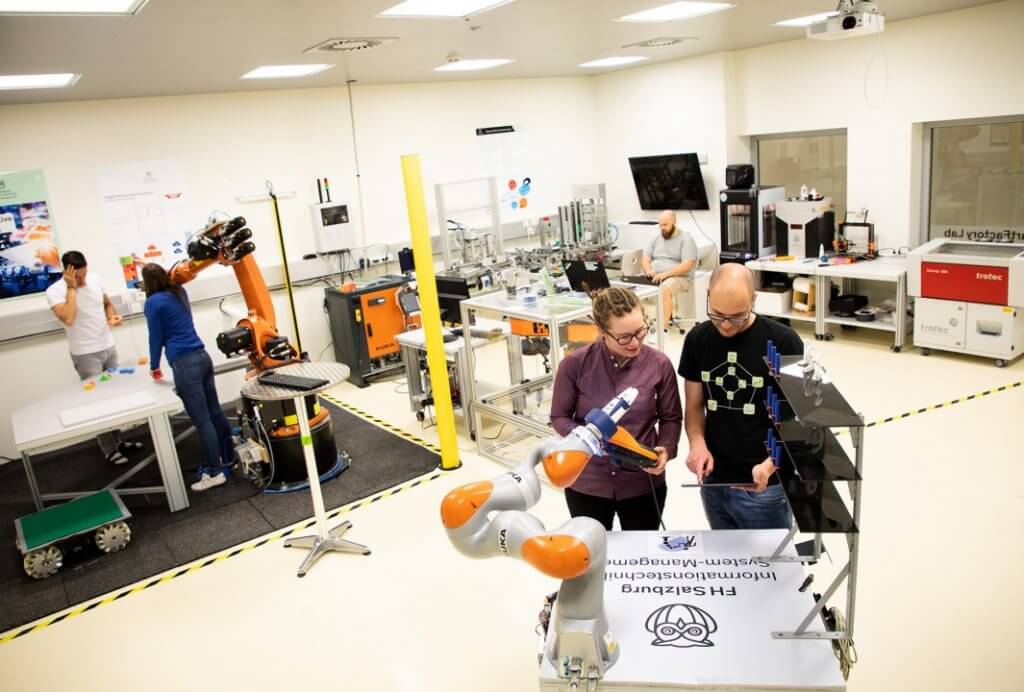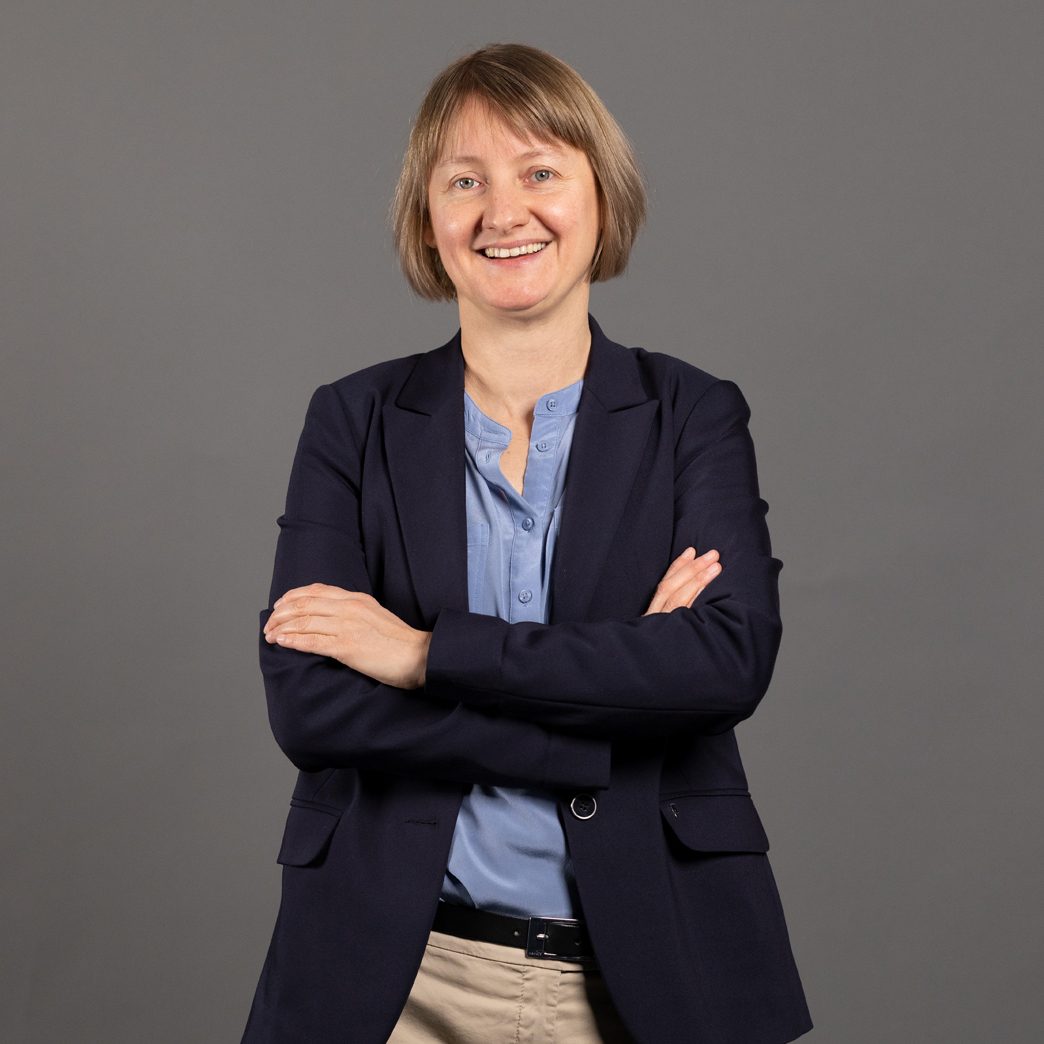
These are Salzburg’s key research and transfer centers:
Digitalization
Josef Ressel Center for Intelligent and Secure Industrial Automation
The Josef Ressel Center for Intelligent and Secure Industrial Automation at FH Salzburg conducts research under the direction of FH-Prof. DI Dr. Stefan Huber on the fundamentals of digital assistants for industrial machines that enable intelligent and secure operations. This assistant should be capable of relieving and supporting human operation by providing assistance in monitoring and controlling machines. The three research fields, OT Architecture, OT Intelligence, and OT Security, form the foundation for the digital assistant. The center was opened in the summer of 2022. Partners include the companies Copa-Data, B&R Industrial Automation, and SIGMATEK.
Center for Geoinformatics (Z_GIS)
The Center for Geoinformatics is an interdisciplinary competence center for GISciences at the University of Salzburg. Z_GIS collaborates with academic and industrial partners to conduct research on geospatial issues in both fundamental and applied research. The research focus lies in the areas of Earth Observation Analytics with an emphasis on object-based image analysis, monitoring and resource management, landscape structure analysis, security and vulnerability research, as well as mobility research and geo-social analyses.
Christian Doppler Laboratory gEOHum
Part of Z_GIS is the Christian Doppler Laboratory gEOHum (Earth Observation for Humanitarian Action). The laboratory, which was opened 2020, investigates the extent to which satellite imagery and other Earth observation data can support humanitarian missions and collaborates with Médecins Sans Frontières (Doctors Without Borders). This marks the first collaboration between a Christian Doppler Laboratory and an NGO.
Geospatial information allows for better assessment of crisis areas and planning of relief efforts. The gEOHum team, led by Prof. Dr. Stefan Lang, utilizes this information to create real-time map representations. Artificial intelligence methods aid in the extraction, analysis, and processing of the data.
Josef Ressel Center for Secure Energy Informatics
With the digital transformation of the energy sector, traditional energy grids are becoming intelligent (Smart Grids). Digitization creates interfaces with other areas such as electromobility and smart homes.
The Center for Secure Energy Informatics (ZSE), as the successor organization to the Josef Ressel Center for user-oriented Smart Grid Privacy, Security, and Control (2013 – 2017), collaborates with industry and research partners to research the digitization of future energy systems and their protection against external attacks and data misuse. The ZSE is based at Salzburg University of Applied Sciences and is led by Prof. Dr. Dominik Engel. Research partners include Salzburg Research, Salzburg AG, Salzburg Wohnbau, successfactory consulting group, and Bosch.
Josef Ressel Center for Dependable System-of-Systems Engineering
The Josef Ressel Centre at FH Salzburg led by FH-Prof. Dr. Christian Neureiter conducts research on “Dependable System-of-Systems Engineering.” In collaboration with industry partners, it explores methods for developing reliable cyber-physical systems, focusing on examples such as Smart Grid, Smart Cities, Automotive, and Industry 4.0. These cyber-physical systems, which combine hardware and software components, such as electric vehicles or Smart Grids, are critical components of the future, requiring reliable operation.
Center for Human Computer Interaction
The Center for Human-Computer Interaction in Salzburg focuses under the direction of FH-Prof. Dr. Christian Neureiter on the relationship between humans and computers or technologies. It conducts interdisciplinary research on various topics with the goal of understanding how technology can support individuals in their daily lives. The research encompasses not only the technological aspects but also psychology, sociology, design, and aesthetics.
I3Lab
Location focus HCI/Department of Artificial Intelligence and Human Interfaces (AIHI).
The Joint PLUS/AIT Lab aims to provide impetus in the sense of transfer in the field of new interface solutions for the economy, industry, and society, to bundle the corresponding competencies, and to initiate and implement new perspectives with Next Generation HCI research.
COMET Projekt DiMo-NEXT
The COMET Project DiMo-NEXT of the Salzburg Research Forschungsgesellschaft will address various topics related to digital movement. This will involve integrating transdisciplinary behavioral psychology, movement data analysis, sustainable materials, and sensor technology in the application areas of sports, health, and well-being. Using a data-driven and human-centered approach combined with digital technologies such as personalized advice, explainable AI, and intelligent and sustainable materials, the project will explore how behavioral changes can be facilitated and how the experience of physical activity, athletic performance, and overall well-being can be improved.
Corporate partners in the project: adidas, Amer Sports, Atomic, Gesundheitszentrum Bärenhof Bad Gastein, Datwyler, Infineon, Karl Mayer, Pacemaker, Pierer Innovation, QUS-Body connected, Saphenus, tech2people, Wintersteiger, and Zainer.
Digital Innovation Hub (DIH) West
IDA Lab – Intelligent Data Analytics Lab
The IDA Lab brings research in Data Science and Artificial Intelligence to Salzburg companies. It is a collaboration between the University of Salzburg (project lead), Paracelsus Medical University, Salzburg Research Forschungsgesellschaft, and University of Applied Sciences Salzburg. The lab is supported by the State of Salzburg as part of the Science and Innovation Strategy 2030 (WISS 2030).
The IDA Lab serves as the regional point of contact for research questions from the business and scientific communities. Together with industrial partners, the IDA Lab team works on data-related challenges in practical applications. The lab consists of seven teams with various areas of focus, such as machine learning, mobility, and biostatistics.
SMART Factory Lab
5G Measurement Lab
5G enables the use of wireless networks for safety-critical systems such as Industry 4.0, Smart Grids, or autonomous vehicles. For this purpose, the networks need to be reliable. In the 5G Measurement Lab (5G-MLab), Salzburg Research develops methods to measure the reliability of 5G through reference scenarios in the automotive and industrial sectors.
Non-university research centers:
- Salzburg Research
- Research Studios Austria Research Society
- iSPACE for Planning (“Smart Settlement”)
- iSPACE on Infrasafety (“Smart 4D ENVIRON”)
- Data SCIENCE (Big Data Analytics & Data Management): Salzburg, Vienna – with a focus on data analysis, artificial intelligence, and information retrieval.
Life Sciences
Centre for Cognitive Neuroscience (CCNS)
The Center for Cognitive Neuroscience at the University of Salzburg investigates the connections between neural processes and human behavior. The CCNS is characterized by interdisciplinary research, with psychology, linguistics, biology, physics, and computer science at the University of Salzburg collaborating with neurologists from Paracelsus Medical University and clinical partners such as the Christian Doppler Clinic on fundamental research.
Ludwig Boltzmann Institute (LBI) for Digital Health and Prevention
At the LBI, the goal is to explore how cardiovascular patients can be supported in maintaining a healthier lifestyle through digital technologies. The institute, opened in 2019, is located at the University Institute of Sports Medicine at the University Hospital Salzburg. Research partners include the University and State Hospital Salzburg (SALK), Salzburg Research Forschungsgesellschaft, Salzburg University of Applied Sciences, the Austrian Institute of Technology, and Paris Lodron University Salzburg.
Cancer Cluster Salzburg
The Cancer Cluster Salzburg (CCS) brings together 16 expert groups in basic, translational, and clinical cancer research from the Salzburg Cancer Research Institute (SCRI), Paris Lodron University Salzburg (PLUS), and Salzburg University Hospitals (SALK).
CCS focuses on the interactions between cancer cells, their microenvironment, and the immune system to explore new cancer-causing mechanisms and develop innovative therapies with improved therapeutic efficacy.
further research centers:
- BioMed Center Salzburg
- Ecomedicine Virtual Reality Physiology Lab
- Clinical Research Center Salzburg
- University Hospital Salzburg
- Salzburg Cancer Research Institute
Tech4Green
Center for Alpine Construction
Salzburg Center for Smart Materials
Weitere Zentren:
Smart Tourism
Tourism Research
EDIH Crowd in Motion
Ein Konsortium aus gemeinnützigen Forschungs- und Technologieorganisationen, Innovationsbeschleunigern, Crowd-Plattform-Anbietern und Digital Fabrication Labs (Fablabs) der österreichischen digitalen Innovationslandschaft. Eine Bündelung von Expertise, um die digitale Transformation von Organisationen mit Fokus auf die Tourismus-, Sport- und Freizeitindustrie sowie den öffentlichen Sektor zu unterstützen und voranzutreiben.
University Institutions:
This might also interest you
6. March 2025
salz21: Necessary Steps for the Future
On March 5, 2025, salz21 | Home of Innovation once again provided a platform for future topics, innovations, and interdisciplinary exchange. More than 1,000 visitors took the opportunity to learn about current developments and discuss perspectives for tomorrow. Three topics were particularly dominant: climate protection, artificial intelligence, and a strong Europe.
25. September 2024
Green Deal: How Sustainable Business Development Can Look
The EU aims to create political and legal frameworks through the Green Deal to transform both the economy and society in a sustainable way. The Pinzgau-based company Design Composite demonstrates how this can be implemented.
6. September 2024
Franz-Benjamin Mocnik researches the communication of places.
In Salzburg, there is an exciting digitization research project: Franz-Benjamin Mocnik is studying the communication of places for the Faculty of DAS.
12. August 2024
SBS: One Software for Many Self-Service Devices
As a leading provider of banking software in Salzburg, SBS is now exploring new markets. The company remains true to its core segment by offering manufacturer-neutral software for self-service devices in additional sectors.
